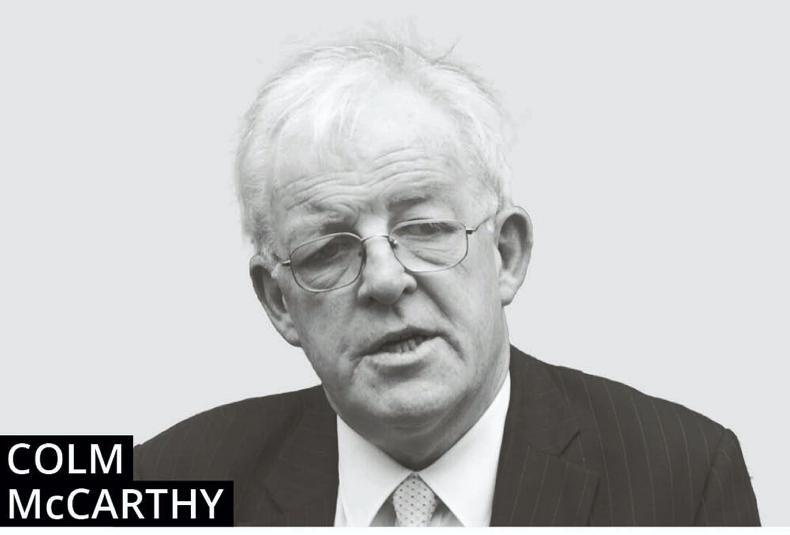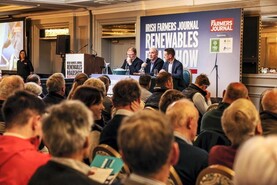Agriculture is in the firing line, with four times the EU’s per capita emissions, because of the anomalous inclusion of exports as well as domestic consumption in the calculation formula.
This is not the procedure used for other sectors.
Ireland’s production of oil products is zero, but consumption is (rightly) the basis of emissions measurement, so the transport sector in Ireland gets debited with the petrol emissions, not Saudi Arabia.
The same logic would see farm emissions debited to consuming countries, as former environment minister Denis Naughten pointed out in these pages last week. Unfortunately, the international measurement conventions are fixed for now, but the anomaly is so glaring that deputy Naughten is right to keep banging on about it and farm organisations should be doing the same.
Ireland takes the rap for its success in food export markets, but also for imported oil and coal
Since the Intergovernmental Panel on Climate Change (IPCC) has not seen fit to review the measurement methodology and the EU follows its lead, Ireland is stuck with the appearance of high farm emissions, despite food consumption per head no higher than the European average.
Ireland takes the rap for its success in food export markets, but also for imported oil and coal. It is possible that better attribution of worldwide emissions will eventually emerge and there is support for reform through the universal adoption of consumption-based measurement from economists, for what that may be worth.
A more immediate problem has come to the fore in recent weeks.
If Ireland fails to meet whatever overall targets are set, there could be penalties payable to the EU directly
If targets for carbon emissions are missed in one sector, extra pressure is likely on others, even those that have done whatever is asked of them.
Of course, sector-by-sector targets are not likely to deliver an efficient adjustment – a universal carbon tax would be a better option, but that ship has sailed and there will be territorial, country-by-country, emissions targets, inconsistently measured.
If Ireland fails to meet whatever overall targets are set, there could be penalties payable to the EU directly, a cost for the Exchequer and hence for everybody, as well as indirect costs for complying sectors asked to compensate through the imposition of tougher limits. Every sector has an incentive to monitor the performance of others.
Producing extra electricity for export via data centres makes sense only if the export price covers the full system costs
It is now likely that the electricity sector will produce extra emissions, both because demand is rising after a prolonged period of low or zero growth, and because decarbonisation of generation is proving to be complex and expensive.
Since electricity is cordoned off, so to speak, along with some other heavy industries, into a pan-European emissions trading system called the ETS, it might appear that extra emissions take care of themselves, but this does not follow.
Producing extra electricity for export via data centres makes sense only if the export price covers the full system costs. It does not do so automatically and in the case of the data centre industry, there are serious national costs that no public relations campaign can conceal.
These extra costs, for back-up generation used infrequently and for grid reinforcement, fall on everybody else and are not recovered from the data centre operators.
It is not fair to apportion all the blame on the data centres for the risk of blackouts this winter, although they, and their cheerleaders, are a large part of the problem. This looming crisis was foreseen and warned against in explicit terms by the Irish Academy of Engineering and others. Capacity has become too tight and unexpected outages in two gas units, along with disappointing wind output, have placed the system in jeopardy.
We’ve cautioned about increased use of back-up generation, because the clear ambition of CII members is to use clean, green electricity
The data centre industry needs 24-hour reliable power and has a lobby group, part of IBEC, called Cloud Infrastructure Ireland (CII), headed by Michael McCarthy. He explained to Daniel Murray of the Business Post that his members opposed any moratorium on more data centres, any requirements that they move out of Dublin or conditions that they build more on-site generation.
“We’ve cautioned about increased use of back-up generation, because the clear ambition of CII members is to use clean, green electricity.”
At present, the only available green electricity happens to be wind, which is interruptible and cannot be backed up by burning emissions certificates purchased in Norway.
Ireland should position itself as the place to invest due to its abundance of green energy and treated water
You can buy a wind farm in Donegal, but you cannot run a data centre on clean, green electricity, no matter how many Donegal wind farms you own. For the foreseeable future, wind needs gas back-up and will need more with more data centres. Tánaiste Leo Varadkar told Daniel Murray: “It’s actually a green energy opportunity. The solution is more supply of wind and other renewables.”
He continued: “Ireland should position itself as the place to invest due to its abundance of green energy and treated water.”
The current blackout worries are due to a shortage of stable green energy, Tánaiste, and the abundance of treated water will be a surprise to engineers around the country.






 This is a subscriber-only article
This is a subscriber-only article










SHARING OPTIONS: